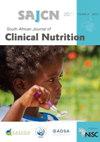Nutritional interventions and outcomes of children with short bowel syndrome in a tertiary hospital setting in South Africa
IF 0.6
Q4 NUTRITION & DIETETICS
引用次数: 0
Abstract
Objectives: To describe the impact of nutritional interventions on the outcomes of children with short bowel syndrome (SBS). Design: This was a retrospective descriptive observational review where data were obtained from the patient’s medical records. Subjects and setting: Children with SBS between the ages of 0 and 24 months who obtained this diagnosis between January 2005 and December 2015 at a tertiary paediatric hospital in Cape Town were investigated. Results: There were 46 patients (62% male, 38% female) included in the study. The median duration of parenteral nutrition (PN) support was one month (0.6, 2.2 months), after which 83% of patients were weaned from PN. Enteral nutrition was commenced in 96% of patients, with the majority (n = 36; 82%) starting on day six (±6; range 1–29 days) postoperatively and 80% of patients attaining full feeds at median 1.2 months (0.2, 36 months). Patients displayed a mean weight and length gain of 15 g/day (±4; range 19–92 g) and 2 cm/month (±1.4; range 0.25–4 cm) respectively. The main complications were PN-associated cholestasis (n = 17), fat malabsorption (n = 13) and vitamin D deficiency/insufficiency (n = 5). Conclusion: This study showed that early initiation of PN support was attained, and that most patients were able to achieve enteral autonomy.南非某三级医院短肠综合征儿童的营养干预和结果
目的:描述营养干预对儿童短肠综合征(SBS)预后的影响。设计:这是一项回顾性描述性观察综述,数据来自患者的医疗记录。受试者和环境:对2005年1月至2015年12月在开普敦一家三级儿科医院获得诊断的0至24个月的SBS儿童进行了调查。结果:本研究共有46例患者(62%为男性,38%为女性)。肠外营养(PN)支持的中位持续时间为一个月(0.6、2.2个月),之后83%的患者断奶。96%的患者开始肠内营养,大多数(n = 36;82%),80%的患者在中位1.2个月(0.2,36个月)达到完全喂养。患者的平均体重和身高增加了15 g/天(±4;范围19–92 g) 和2 cm/月(±1.4;范围0.25–4 cm)。主要并发症为PN相关胆汁淤积(n = 17) ,脂肪吸收不良(n = 13) 和维生素D缺乏/不足(n = 5) 。结论:本研究表明,PN支持可以早期启动,大多数患者能够实现肠内自主。
本文章由计算机程序翻译,如有差异,请以英文原文为准。
求助全文
约1分钟内获得全文
求助全文
来源期刊

South African Journal of Clinical Nutrition
NUTRITION & DIETETICS-
CiteScore
2.50
自引率
9.10%
发文量
21
期刊介绍:
1.The Journal accepts articles from all basic and applied areas of dietetics and human nutrition, including clinical nutrition, community nutrition, food science, food policy, food service management, nutrition policy and public health nutrition. 2.The Journal has a broad interpretation of the field of nutrition and recognizes that there are many factors that determine nutritional status and that need to be the subject of scientific investigation and reported in the Journal. 3.The Journal seeks to serve a broad readership and to provide information that will be useful to the scientific community, the academic community, government and non-government stakeholders in the nutrition field, policy makers and industry.
 求助内容:
求助内容: 应助结果提醒方式:
应助结果提醒方式:


